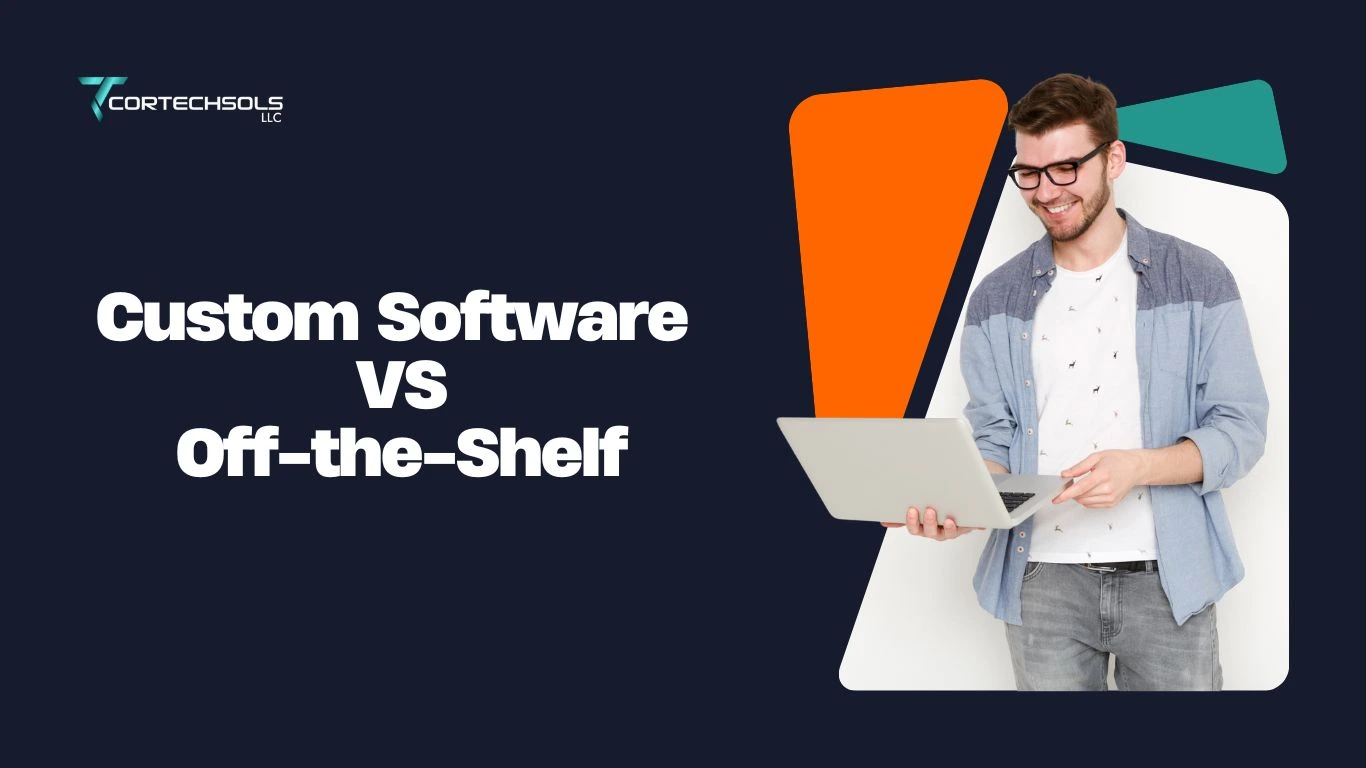Imagine you’re opening a new store. You have two options for furniture: buy ready-made shelves from IKEA or hire a carpenter to design custom shelving just for your space. Both options work — but which one makes more sense for you?
That’s exactly the decision businesses face when it comes to Custom Software vs Off-the-Shelf.
Every business runs on software — from handling sales and employees to managing data and customer experiences. The tricky part is deciding whether to develop your own software or use a ready-made solution that’s already on the market.
What is Custom Software Development?
Custom software development is when software is built specifically for your business needs. Think of it as a custom-made suit:
- It fits your exact requirements.
- You choose the features, design, and integrations.
- You own it and can modify it as your business grows.
Example: Imagine a growing logistics company. Off-the-shelf tracking tools might work at first, but as they expand, they need software that connects drivers, warehouses, and clients in real time. That’s where scalability in custom software becomes a game-changer.

What Are Off-the-Shelf Software Solutions?
Off-the-shelf software solutions are pre-built tools made for general business use. Think of apps like Slack, Shopify, or QuickBooks. They’re like ready-made outfits:
- Affordable and quick to use.
- Packed with standard features most companies need.
- Updates, security, and maintenance are handled by the vendor.
For example, a small bakery may not need custom tools — a simple point-of-sale (POS) system like Square does the job. That’s one of the biggest advantages of off-the-shelf software: you can start using it today.
The Real Cost: Beyond the Price Tag
When comparing the cost of custom software vs off-the-shelf, the first reaction is often:
- Custom = expensive
- Off-the-shelf = cheap
But the truth is more layered.
Hidden costs in off-the-shelf software include:
- Paying monthly fees forever.
- Paying for features you never use.
- Losing productivity when the tool doesn’t fit your workflow.
Custom software costs include:
- Higher upfront investment.
- Development and testing time.
- Ongoing maintenance and support for custom software (though you control this).
Off-the-shelf looks cheaper at first, but custom may save money in the long run if your business has unique needs.
Pros and Cons of Custom Software
Pros of custom software development:
- Customized to your exact needs.
- Full ownership and control.
- High scalability in custom software as your business grows.
- Competitive advantage — your rivals can’t just buy the same tool.
Cons of custom software development:
- Higher upfront costs.
- Takes longer to launch.
- Requires planning and technical expertise.

Advantages of Off-the-Shelf Software
Pros of off-the-shelf software solutions:
- Lower upfront cost.
- Fast setup — ready in minutes or days.
- Vendor handles updates and fixes.
- Tried and tested by thousands of businesses.
Cons of off-the-shelf software solutions:
- Limited customization.
- May not integrate well with your other tools.
- Features can be missing or excessive.
- Future growth may force you to switch later.
Myths Busted: Custom vs Commercial Software
Many people get stuck because of misconceptions:
- “Custom software always takes years.”
With agile development, smaller apps can launch in weeks. - “Off-the-shelf is always cheaper.”
Monthly subscriptions add up, sometimes costing more than a one-time custom build. - “Custom = complicated, off-the-shelf = simple.”
In reality, custom can actually be simpler, because it’s designed for how you work.
This is why comparing custom vs commercial software requires a realistic look at your business, not just general myths.
Business Software Solutions Comparison
Here’s a quick business software solutions comparison framework to help you decide:
| Factor | Off-the-Shelf Software | Custom Software Development |
| Setup Speed | Immediate | Weeks to months |
| Initial Cost | Low | High |
| Long-term Cost | Adds up with licenses | Can be cheaper over time |
| Security & Data Control | Standard security, managed by a vendor | Customizable security, full data control |
| Scalability | Limited | High scalability |
| Customization | Minimal | Full control |
| Ownership | Vendor controlled | You own it |
| Support | Vendor dependent | Controlled by you |
Real-World Example
- Startup Case: A 5-person marketing agency just needs project tracking → Trello or Asana (off-the-shelf) works perfectly.
- Growth Case: The same agency grows to 100+ clients. They now need automation, custom reporting, and client dashboards. Here, custom software development makes sense because off-the-shelf software can’t keep up.
This shows how the choice changes over time — it’s not fixed forever.

Maintenance and Support for Custom Software
One big difference: maintenance and support for custom software are in your hands. That’s good because you decide what updates to roll out and when.
Off-the-shelf software, on the other hand, means you depend on the vendor. If they shut down, change features, or raise prices, your business feels the impact.
The Final Checklist: How to Decide
Before making your choice, ask yourself:
- Do you need to launch quickly? → Off-the-shelf.
- Do you need unique features? → Custom.
- Is the budget very tight right now? → Off-the-shelf.
- Is growth and control important? → Custom.
How CortechDev Can Help
At CortechDev, we don’t just build software — we help you make the right choice. Some businesses thrive with off-the-shelf software solutions, while others unlock their true potential with custom software development. Our role is to cut through the noise and guide you toward what actually works for your business model, budget, and growth plans. From comparing options and mapping out the pros and cons of custom software, to designing systems that can scale with you, we make the decision process clear — and the implementation stress-free. With CortechDev, you get more than software; you get a partner invested in your long-term success.
Conclusion: It’s About Fit, Not Labels
When comparing Custom Software vs Off-the-Shelf, remember — it’s not about which is better overall. It’s about which fits your business today and tomorrow.
- If you’re starting small or need something fast → choose off-the-shelf software solutions.
- If you want a tool that grows with you, gives full control, and sets you apart → invest in custom software development.
At the end of the day, the right choice is the one that helps your business work smarter, not harder.










